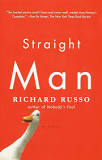Richard Russo’s Take on Academia
 I don’t normally use this space to review twenty-year-old books, but for Richard Russo, I’ll make an exception. Regular readers know I’m a huge Russo fan. He’s been a big influence on my own writing, and I thought I’d read everything he wrote. But last month a friend recommended one of his novels that I’d missed: Straight Man, published in 1997. It’s the funniest serious novel I’ve ever read.
I don’t normally use this space to review twenty-year-old books, but for Richard Russo, I’ll make an exception. Regular readers know I’m a huge Russo fan. He’s been a big influence on my own writing, and I thought I’d read everything he wrote. But last month a friend recommended one of his novels that I’d missed: Straight Man, published in 1997. It’s the funniest serious novel I’ve ever read.
The narrator, William Henry Devereaux Jr., is heir to a famous name and not much else. He’s a writing professor and temporary chair of the English Department at a third-rank state college in a small fictional town in Pennsylvania. Hank’s father, who looms large throughout the book, was a hugely successful academic and literary critic and a hugely unsuccessful human being. An ice-cold man—at least when (and maybe even when) bedding his female students—Deveraux Sr. walked out when Hank was young and is now poised to return so his ex-wife and son can care for him in his senility.
Hank has plenty of hangups from that childhood, yet he’s chosen to follow in his father’s footsteps, just without the success part. At 29 he wrote his first and only novel, meaningfully titled Off the Road, a book that got good reviews but failed to sell (one of many details in the novel likely to resonate with aspiring authors). Now he’s tenured but trapped, stuck in a nonfunctioning academic world, ruling over an unruly staff of miscreants, and leading a writing workshop for angry and oversexed young adults. (His best advice to one: Always understate necrophilia.)
 Russo surrounds Hank with a hilarious, perfectly drawn group of colleagues, almost all of whom have filed grievances against him. There’s Orshee, a nickname resulting from his habit of correcting anyone who uses only the male pronoun; Teddy Barnes, a close friend despite the fact that he’s in love with Hank’s wife; Finny, who claims a PhD from a university whose only asset seems to be a post office box in Texas. And then there’s Gracie, a feminist (and don’t you forget it) poet who hits Hank in the face with a notebook, puncturing his nose with the end of the spiral she’s teased out of place,
Russo surrounds Hank with a hilarious, perfectly drawn group of colleagues, almost all of whom have filed grievances against him. There’s Orshee, a nickname resulting from his habit of correcting anyone who uses only the male pronoun; Teddy Barnes, a close friend despite the fact that he’s in love with Hank’s wife; Finny, who claims a PhD from a university whose only asset seems to be a post office box in Texas. And then there’s Gracie, a feminist (and don’t you forget it) poet who hits Hank in the face with a notebook, puncturing his nose with the end of the spiral she’s teased out of place,
Being stuck in this stale and dreary situation and now pushing 50, Hank is in the midst of a midlife crisis he’d rather not recognize, suffering from a bladder problem that is either a kidney stone or cancer or all in his head. The stress is high on every front. The state legislature has slashed the school’s budget and Hank’s faculty revolts over rumors he’s offered up a list of dispensable staff (he’s actually refused to do a list, but he’s too stubborn to deny the rumor). The uproar prompts a vote to yank Hank’s chairmanship, a meeting Hank observes from above—trapped in the ceiling with an uncontrollable urge to pee. The school showdown comes to a head over a long weekend, which also coincides with Hank’s medical crisis, the breakup of his daughter’s marriage, and news that his father is coming back to town. To make matters worse, it just happens to be the weekend that Hank’s wife, the rock in his life, is out of town job hunting. When she leaves, she tells him, “I have this fear. I can’t decide where you’re going to be when I get home. In the hospital or in jail.” In fact, he ends up in both, though only briefly.
As funny as the novel is, it’s deadly serious. Plot is secondary in Russo’s novel, and that is certainly the case here. Instead he focuses on relationships and people and the things that make life what it is. His novels specialize in unmanageable middle-aged men (or, more accurately, men who don’t want to be managed), and he understands them better than anyone. Hank is not quite as complex as Sully, the unforgettable protagonist in Nobody’s Fool and Everybody’s Fool, but he’s a close second. Different, but complex and perfectly drawn. Hank’s relationship with his father is not one I identified with, but many men will, and Russo makes sure I understand it even if I didn’t experience it. That’s Russo at his best. And so is this book.
Mark Willen
Mark Willen’s novels, Hawke’s Point, Hawke’s Return, and Hawke’s Discovery, were released by Pen-L Publishing. His short stories have appeared in Corner Club Press, The Rusty Nail. and The Boiler Review. Mark is currently working on his second novel, a thriller set in a fictional town in central Maryland. Mark also writes a blog on practical, everyday ethics, Talking Ethics.com.
- Web |
- More Posts(48)